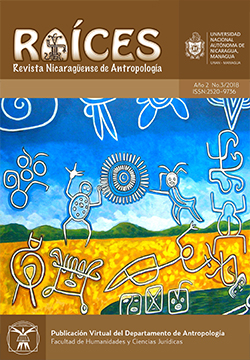Deconstructing hegemonic masculinities - a means for the prevention of gender-based violence in the communities of El Viejo - Chinandega
DOI:
https://doi.org/10.5377/raices.v2i3.6904Keywords:
Patriarchal system, Masculinities, families, society, ViolenceAbstract
This article is based on the involvement of the author during the last 3 years (2016-2018) in community actions and interventions where processes for social change are promoted in favor of equity and gender equality, therefore the title: «Deconstructing hegemonic masculinities - a means for the prevention of gender-based violence». It aims to rescue some elements extracted from the experience of working with men of different ages, who have had to assume challenges to achieve real changes that contribute to the development of themselves, their companions, families and community spaces. The purpose of this research article is to make known the importance of working with men to promote awareness, gender awareness, this to gestate consequent changes in the relationships of men with their families, promoting nonviolence and healthy affectivity ; To this end, actions must be carried out that question mandates assigned by the same society in which power relations favor men, consequently relegating women to situations of violence and submission.
The subject has been approached from the holistic-anthropological approach, with its own methods such as ethnography and particular techniques of science such as direct and participant observation, application of open and in-depth interviews.
Downloads
1177
References
Castillo, J (2003) “Masculinidades en Positivo”, Estelí Nicaragua Recuperado de: Asociación para la Investigación del Desarrollo Sostenible de Las Segovias ADESO
Faur, E (2004) “Las relaciones de género desde la perspectiva de los hombres” Recuperado de: https://www.unicef.org/masculinidades.pdf
Fondo de Población de las Naciones Unidas-UNFPA, (2003), “Alternativas, queremos y podemos tener una vida mejor cuidando nuestras relaciones” Recuperado de: https://nicaragua.unfpa.org/sites/default/files/pub pdf/Documento-Estrategia
Garrocho, F. (2012). “Educación y modelos de género en Europa durante los siglos xix y principios del xx: “el modelo de finlandia”1 y el nacimiento del feminismo europeo” [online] Institucional.us.es. Available at: http:// institucional.us.es/revistas/cuestiones/21/art_16.pdf [Accessed 30 Aug. 2018].
Hernández, O (2007), “Estudios sobre Masculinidades. Aportes desde América Latina”. Revista de Antropología Experimental. Recuperado de: http://americalatinagenera.org/newsite/images/cdr documents/publicaciones/estudios_sobre_masculinidades_al.pdf.
PNUD (2005), Informe sobre desarrollo humano, Madrid, Ediciones Mundi Prensa.
Ortner S. X, (1973) “Antropología de América”. Inglaterra. Recuperado de: publicaciones británicas, purificación, creencias y prácticas
TROCAIRE (2015) “Involucrando a los hombres para la eliminación de la violencia de género en Nicaragua”. Managua, Nicaragua Recuperado de: www.trocaire.org
Welsh, P & Muñoz, X, (2004) “Hombres de verdad o la verdad sobre los hombres”. Managua-Nicaragua. Recuperado de: https://revistas.unimilitar. edu.co/index.php/rlbi/article/download/3388/2913
Welsh, P & Piñón F (2003) “Apuntes para un Marco Teórico: Género y Masculinidades” Recuperado de: http://www.ilam.org/viejo/ILAMDOC/museos.es/4-2008.pdf
Welsh, P (2001) “Los hombres no son de marte, desprendiendo el machismo en Nicaragua” Recuperado de: EC.DAPHNE PROGRAMME, 2001.
Downloads
Published
How to Cite
Issue
Section
License
This license enables reusers to distribute, remix, adapt, and build upon the material in any medium or format for noncommercial purposes only, and only so long as attribution is given to the creator. If you remix, adapt, or build upon the material, you must license the modified material under identical terms.




